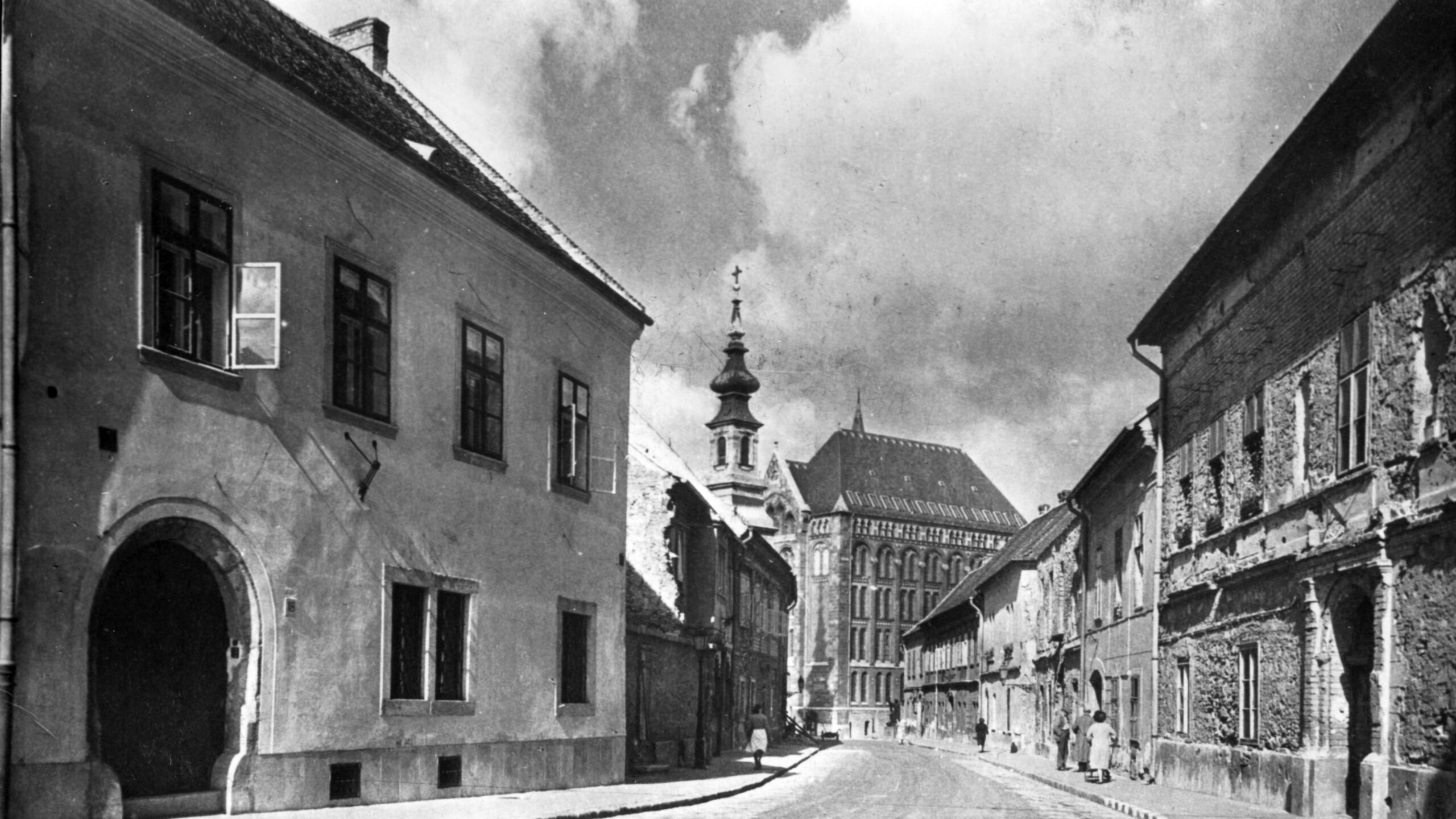The investigation against the Lutheran congregation at Bécsi Kapu Square in the Buda Castle was undoubtedly one of the earliest and most extensive church-targeted operations conducted by the Hungarian State Police State Protection Department (ÁVO), later known as the State Protection Authority (ÁVH). Remarkably, the case files have survived in exceptional detail. The main target of the investigation was Lutheran pastor Ferenc Sréter de Szanda. Sréter was ordained in 1932, and a decade later he was elected spiritual leader of the Buda Castle church. Services typically gathered 80 to 120 attendees. Sréter represented the so-called ‘awakening’ or charismatic movement within the church and was an uncompromising religious leader. His congregation also included a number of retired right-wing military officers, which understandably drew the attention of the emerging communist secret police.
The very first information about the group had evidently been collected since 1946, initially under the codename ‘Rózsások’ (‘Rosy Ones’, or ‘The Ones with the Rose’), and from the spring of 1952 onward, under the codename ‘Sátánok’ (‘Satans’). The underlying assumption was that Sréter and his associates were ‘conspiring against democracy under the guise of religious gatherings at the Lutheran community of Bécsi Kapu Square.’ According to state security data, Sréter and his son, Miklós, had allegedly been recruited as agents by the American intelligence services. In addition to Sréter, the investigation also targeted Assistant Pastor G Gy, Colonel (ret) Bertalan Zsótér and his wife, Colonel (ret) Etele Reök, and finally, congregational elders Valdemár Benczúr and Gyula Tomka.1
The church originally came to the attention of the secret police because a worker from Csepel—who had been arrested for criticizing communism—had previously attended services there. Recruiting informants within the congregation proved difficult, as a ‘closed leadership circle’ existed within the community, and Sréter allowed only his most trusted people into it. One of the first agents was ‘Sipos’, a worker recruited on a ‘compromising basis’, that is, blackmailed. Due to his working-class background, he could not gain access to the inner circle, and his mother happened to be an enemy of Sréter’s. As a result, ‘Sipos’ was tasked only with recording the dates of gatherings, compiling lists of attendees, and retrieving torn-up letters from the trash.
‘Although their reports quoted a few odd remarks…there was no evidence of any anti-regime conspiracy’
The agents continuously monitored what was said during Bible study sessions. Although their reports quoted a few odd remarks—such as anti-evolution views and the belief that Jesus Christ would return after an impending American–Soviet nuclear war—there was no evidence of any anti-regime conspiracy.
The first crackdown on the group came in the spring and summer of 1951: Assistant Pastor G was arrested and accused of insulting the Soviet Union in speeches he had made at the end of World War II. During the 1951 summer deportations of ‘class enemies’ from Budapest (kitelepítések), five church officials and three elders (presbyters) were expelled from the Lutheran church district—among them, several members of the Bécsi Kapu Square church. The Zsótérs and Benczúr were also deported. Assistant Pastor G was eventually released shortly afterward, having agreed to report on the community. He became ‘Pax’, the only truly useful agent the state security service managed to recruit during the investigation.
Sréter maintained continuous contact with the deportees, corresponding with them covertly, organizing collections within the community, and sending money and clothing. The ÁVH requested investigations into the deported individuals from its rural branches, with plans to recruit suitable persons. For example, Benczúr’s deportation officer was an agent whose task was to be friendly, fulfill his needs, and gain his trust. Ultimately, they concluded that Benczúr was too Christian, hated the Soviet Union, and was unsuitable for recruitment. The same assessment applied to the individual who carried letters between Sréter and Mrs Zsótér: ‘We determined that she is fanatically religious, and therefore unfit for recruitment.’
The faithful were openly encouraged not to renounce their Christian beliefs despite the persecution: ‘There are many instances where we are afraid to admit that we are servants of God, his chosen people, because we fear the consequences—we might lose our jobs or face persecution. Let us never lie, never compromise, but boldly accept the service of God, for whoever believes and trusts in God will always receive their reward!’ one elder preached.
Some wanted to be released from their roles as agents but were not allowed to leave. As one officer noted:
‘“Pax” stated during the meeting that the Lutheran congregation in Szarvas wanted to invite him to serve as their pastor…Regarding the Szarvas invitation, he asked what our position was, and whether we would allow it…I told “Pax” that he could not go to Szarvas. I made it clear that the reason was that his current work had shown no indication that he sincerely wished to atone for his past sins.’
In the spring of 1952, plans were made to install surveillance equipment in Sréter’s apartment at 28 Táncsics Mihály Street and in the pastor’s office. The plan was as follows:
‘Sréter’s current telephone line will be deliberately damaged. Arrangements will be made to ensure that the fault report is directed to us at the post office. Then, agents will visit Sréter’s apartment to “repair” the phone and, during the repair, will intentionally break the phone. The telephone will then be replaced. The replacement device, which contains the built-in surveillance equipment, will be indistinguishable—both externally and internally—from standard postal telephones.’
The pastor and some members of the community were also followed on the street. For example, Sréter was surveilled all day on 19 April 1952, under the codename ‘Bécsi’. However, this is when the first shocking mistakes emerged. It must be remembered that this was not the sophisticated, professional Ministry of Interior team of the Kádár era, but the ÁVH under the Rákosi regime, which often misled itself with preconceived notions and amateurish procedures.
‘We established that the registry data did not correspond to reality’
As it turned out, although Etele Reök’s apartment was monitored in mid-May, the investigators mistakenly believed—based on his uncommon first name—that the target was a woman, and therefore reported that he never left the house. An even more shocking error occurred when it turned out that from the very beginning of the investigation, they had confused Ferenc Sréter with another Ferenc Sréter from Graz—who was actually the American agent. Moreover, the pastor’s son was not named Miklós.
‘We established that the registry data did not correspond to reality. According to the materials obtained from the archives, neither Ferenc Sréter nor his son were recruited by the Americans, and in fact it was Okolicsányi Miklós, an American intelligence agent living in Graz, Austria, who was recruited by (the other) Ferenc Sréter and Miklós Sréter.’
Perhaps characteristically, after it was revealed that the target was not an American spy, the investigation continued anyway.
The case ultimately ‘resolved itself’, as Sréter was first removed from his position due to his charismatic views and became an assistant pastor. Then, in the summer of 1954, he left the Lutheran Church and moved toward the free Christian movement. His successor was Lajos Váradi, who, according to state security, ‘adhered to the contract between the state and the church.’ The file was closed in early October 1956 because ‘no progress was made in the case’, and ‘the existing data do not prove that we are dealing with hostile activities that would justify treating it as an ongoing case.’ Nevertheless, an agent was kept within the community just in case hostile activity might resurface.
The story highlights the severe preconceptions with which the Rákosi-era state security operated, but it also shows that their methods were much clumsier than those of their later Kádár-era counterparts. Sréter owed his escape from harsher official repercussions purely to luck, while many of his comrades and colleagues were harassed and forcibly relocated to the countryside. The story also points out that there was only one effective defence against recruitment attempts: unwavering religious faith.
- For all the files quoted here see: Állambiztonsági Szolgálatok Történeti Levéltára (ÁBSZTL), 3.1.5. O-9398. ↩︎
Related articles:







